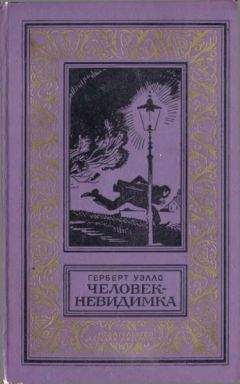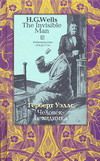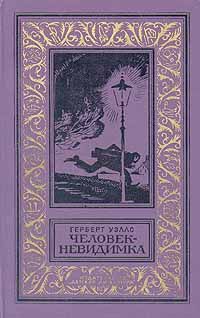H. Wells - Английский язык с Г. Уэллсом "Человек-невидимка"
The Epilogue (эпилог)
So ends the story of the strange and evil experiments of the Invisible Man (так кончается рассказ о необыкновенных и пагубных экспериментах Невидимки). And if you would learn more of him (а если вы хотите узнать о нем больше) you must go to a little inn near Port Stowe and talk to the landlord (вам нужно отправиться в маленький трактир возле Порт-Стоу и поговорить с хозяином). The sign of the inn is an empty board save for a hat and boots (вывеска трактира — пустая доска, на которой /изображены/ только шляпа и башмаки), and the name is the title of this story (а название /трактира/ такое же, как у этой книги). The landlord is a short and corpulent little man (хозяин — низкий полный человечек) with a nose of cylindrical proportions, wiry hair (с длинным носом, жесткими волосами; wiry — похожий на проволоку; жесткий /о волосах, шерсти, траве/), and a sporadic rosiness of visage (и лицом в красных пятнах). Drink generously, and he will tell you generously of all the things (выпейте побольше, и он подробно расскажет вам обо всем; generously — благородно; обильно, щедро) that happened to him after that time (что случилось с ним после того времени /описанных выше событий/), and of how the lawyers tried to do him out of the treasure found upon him (и о том, как юристы пытались отобрать у него найденные при нем деньги; treasure — сокровище; богатство, деньги).
“When they found they couldn’t prove who’s money was which, I’m blessed (когда они обнаружили, что не могут доказать, чьи это деньги, то — подумать только),” he says, “if they didn’t try to make me out a blooming treasure trove (они попытались обойтись со мной, как с найденным кладом без владельца; to make out — разобрать, увидеть; blooming — цветущий; проклятый, чертов; treasure trove — неимеющиевладельцадрагоценности; драгоценныйклад/найденныедрагоценности; позаконупринадлежатгосударству, еслинеобнаруженвладелец/)! Do I look like a Treasure Trove (разве я похож на клад)? And then a gentleman gave me a guinea a night (а потом один джентльмен платил мне по гинее за вечер) to tell the story at the Empire Music ’All — just to tell ’em in my own words — barring one (чтобы я рассказывал эту историю в мюзик-холле «просто за то, чтобы я рассказал всю историю своими словами, кроме одного /факта/»).”
visage [`vIzIG], generously [`GenqrqslI], lawyer [`lLjq], treasure [`treZq], guinea [`gInI]
So ends the story of the strange and evil experiments of the Invisible Man. And if you would learn more of him you must go to a little inn near Port Stowe and talk to the landlord. The sign of the inn is an empty board save for a hat and boots, and the name is the title of this story. The landlord is a short and corpulent little man with a nose of cylindrical proportions, wiry hair, and a sporadic rosiness of visage. Drink generously, and he will tell you generously of all the things that happened to him after that time, and of how the lawyers tried to do him out of the treasure found upon him.
“When they found they couldn’t prove who’s money was which, I’m blessed,” he says, “if they didn’t try to make me out a blooming treasure trove! Do I look like a Treasure Trove? And then a gentleman gave me a guinea a night to tell the story at the Empire Music ’All — just to tell ’em in my own words — barring one.”
And if you want to cut off the flow of his reminiscences abruptly (а если хотите резко прервать поток его воспоминаний), you can always do so by asking if there weren’t three manuscript books in the story (вы всегда можете это сделать, спросив его, не было ли в этой истории трех рукописных книг). He admits there were and proceeds to explain (он согласится, что были, и продолжит объяснять; to admit — допускать, признавать, соглашаться), with asseverations that everybody thinks he has ’em (с клятвенными заверениями, что все считают, будто они находятся у него)! But bless you! he hasn’t (но, право слово, у него их нет).
“The Invisible Man it was took ’em off to hide ’em (невидимка забрал их и спрятал) when I cut and ran for Port Stowe (когда я удрал /от него/ и прибежал в Порт-Стоу). It’s that Mr. Kemp put people on with the idea of my having ’em (это все мистер Кемп рассказывает, будто книги у меня).”
And then he subsides into a pensive state (затем он впадает в задумчивость: «в задумчивое состояние»; to subside — опускаться, падать; впадать, погружаться), watches you furtively (наблюдает за вами украдкой), bustles nervously with glasses (нервно протирает стаканы; to bustle — энергичноделатьчто-либо; суетиться), and presently leaves the bar (и через некоторое время выходит из бара).
reminiscence ["remI`nIs(q)ns], asseveration [q"sevq`reIS(q)n], furtively [`fq:tIvlI]
And if you want to cut off the flow of his reminiscences abruptly, you can always do so by asking if there weren’t three manuscript books in the story. He admits there were and proceeds to explain, with asseverations that everybody thinks he has ’em! But bless you! he hasn’t.
“The Invisible Man it was took ’em off to hide ’em when I cut and ran for Port Stowe. It’s that Mr. Kemp put people on with the idea of my having ’em.”
And then he subsides into a pensive state, watches you furtively, bustles nervously with glasses, and presently leaves the bar.
He is a bachelor man (он холостяк) — his tastes were ever bachelor (у него неизменные/давние холостяцкие вкусы), and there are no women folk in the house (и в доме нет ни одной женщины). Outwardly he buttons — it is expected of him (верхнюю одежду он застегивает на пуговицы — этого требует его положение: «ожидается от него»; outwardly — внешне, снаружи) — but in his more vital privacies (но что касается более интимных и жизненно важных частей туалета; vital — /жизненно/ важный, необходимый; privacy — уединенность; частнаяжизнь, интимнаясфераличности), in the matter of braces for example, he still turns to string (например, подтяжек, он по-прежнему прибегает к веревочке; in the matter of — чтокасается). He conducts his house without enterprise, but with eminent decorum (он ведет свое дело без предприимчивости, но с замечательной благопристойностью; eminent— видный, выдающийся, знаменитый, известный). His movements are slow, and he is a great thinker (его движения медлительны, и он большой мыслитель = склонен к задумчивости). But he has a reputation for wisdom and for a respectable parsimony in the village (в деревне у него репутация мудреца и его уважают за бережливость; wisdom— мудрость; благоразумие; respectable— почтенный, респектабельный; заслуживающий уважения), and his knowledge of the roads of the South of England would beat Cobbett (а его знание дорог Южной Англии превосходит сведения путеводителя; Cobbett— Уильям Коббет /1762 — 1835/, английский публицист, журналист, историк. Наиболее популярным среди его произведений являются путевые заметки, написанные им во время путешествий по южной части Англии).
And on Sunday mornings, every Sunday morning, all the year round (а в воскресенье утром, каждое воскресенье, круглый год), while he is closed to the outer world (пока он закрыт для внешнего мира), and every night after ten, he goes into his bar parlour (и каждый вечер после десяти он отправляется в гостиную), bearing a glass of gin faintly tinged with water (неся с собой стакан джина, чуть разбавленный водой; totinge— слегка окрашивать, придавать оттенок), and having placed this down (и, поставив его), he locks the door and examines the blinds (он запирает дверь и осматривает шторы), and even looks under the table (даже заглядывает под стол).
bachelor [`bxC(q)lq], decorum [dI`kLrqm], parsimony [`pRsImqnI]
He is a bachelor man — his tastes were ever bachelor, and there are no women folk in the house. Outwardly he buttons — it is expected of him — but in his more vital privacies, in the matter of braces for example, he still turns to string. He conducts his house without enterprise, but with eminent decorum. His movements are slow, and he is a great thinker. But he has a reputation for wisdom and for a respectable parsimony in the village, and his knowledge of the roads of the South of England would beat Cobbett.
And on Sunday mornings, every Sunday morning, all the year round, while he is closed to the outer world, and every night after ten, he goes into his bar parlour, bearing a glass of gin faintly tinged with water, and having placed this down, he locks the door and examines the blinds, and even looks under the table.



